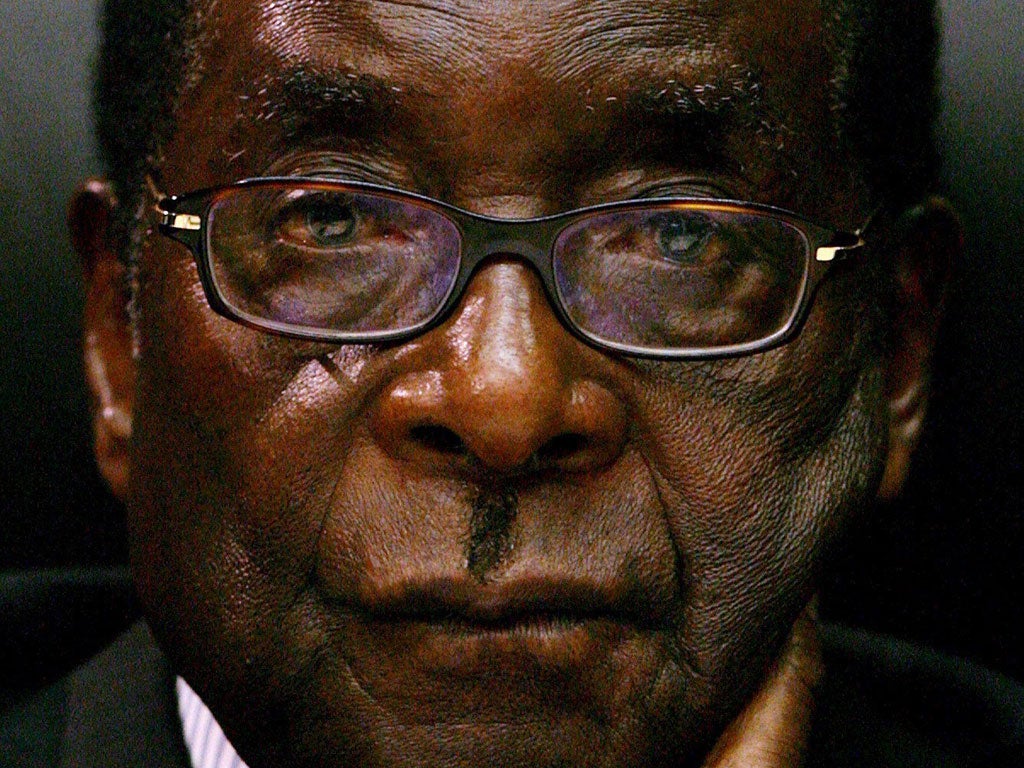Foreign Office balks at EU move to let Mugabe back into Europe
British official dismisses plan to lift travel ban as 'awful' and vows dictator will not be coming to UK

The Foreign Office reacted with horror last night to signals that the European Union wants to lift the travel ban on Robert Mugabe and his closest allies.
Senior sources in the department insisted that Britain's borders would remain closed to the 88-year-old Zimbabwean President.
"That would be awful," a Foreign Office source told The Independent. "I don't think that he or his people will be visiting Britain any time soon – he has burnt his bridges as far as this country is concerned.
"The idea of him shaking hands with the Queen is appalling. He has shown no sign of contrition for his many misdemeanours."
EU officials are considering easing sanctions on the Mugabe regime – first imposed in February 2002 after the head of an observer mission to the presidential election was expelled – in an effort to persuade it to stage free and fair elections.
Under the plan, they would be lifted if Mugabe agreed to a series of moves to end internal repression in the southern African state, including the adoption of human rights protections, the publication of a new constitution and the guarantee of free elections in 2013.
Under the terms of a deal setting up Zimbabwe's power-sharing administration, its government is committed to holding fresh elections next year. Despite his advanced years, Mugabe has said he will stand as President.
Previous elections have been marred by violence, intimidation and allegations of vote-rigging: Mugabe's ruling Zanu PF party was widely accused of "stealing" the election in 2008.
It is understood that a new constitution could be issued within weeks, encouraging suggestions in Brussels that the sanctions could be eased in an attempt to help draw Zimbabwe into the world community.
Talks are planned over whether to approve the move – although there is widespread understanding that it cannot be agreed without Britain's approval.
The hostility of the UK to any easing the international pressure on Mugabe suggests that is unlikely and the Foreign Office believes it would be hard to lend an olive branch to Zimbabwe until Mugabe either steps down or dies.
According to an American diplomatic cable released by Wikileaks, the United States believes the veteran leader has suffered from prostate cancer.
In its latest report on the country's human rights situation, the UK Foreign Office said that levels of state-inspired violence and intimidation have fallen in 2011 but it warned: "Political tension remained high throughout the year and sporadic harassment of civil society activists continued."
Isolating incident: The sanctions
Britain says EU sanctions were imposed to encourage the persons targeted to reject policies that lead to the suppression of human rights, freedom of expression and good governance." They include:
* A ban on travel by Robert Mugabe and his closest henchmen to the EU. More than 160 individuals are named, although the list is revised constantly with 35 removed recently.
* The assets of named individuals – as well as companies with links to Mr Mugabe's regime – are also frozen.
* An arms embargo, because of fears that military equipment could be used to repress internal dissent.
* Providing military advice, as well as technical guidance on manufacturing military equipment, is outlawed.
Join our commenting forum
Join thought-provoking conversations, follow other Independent readers and see their replies
Comments